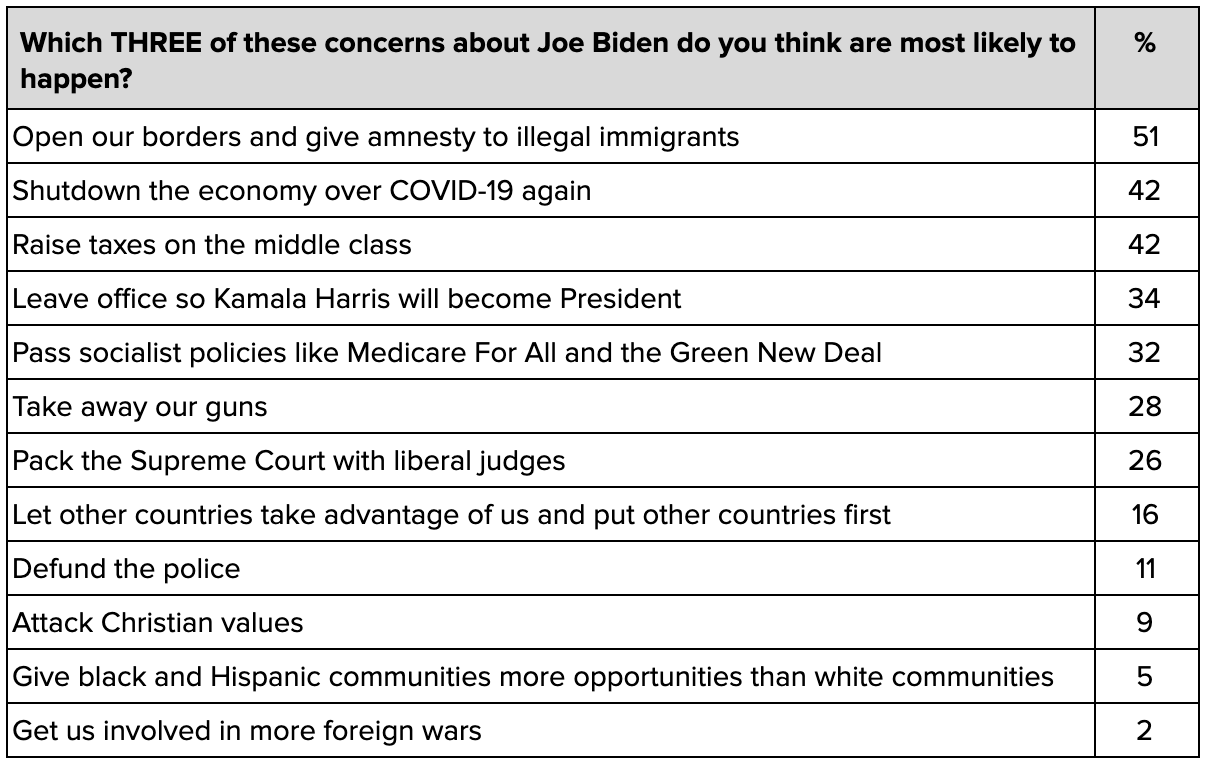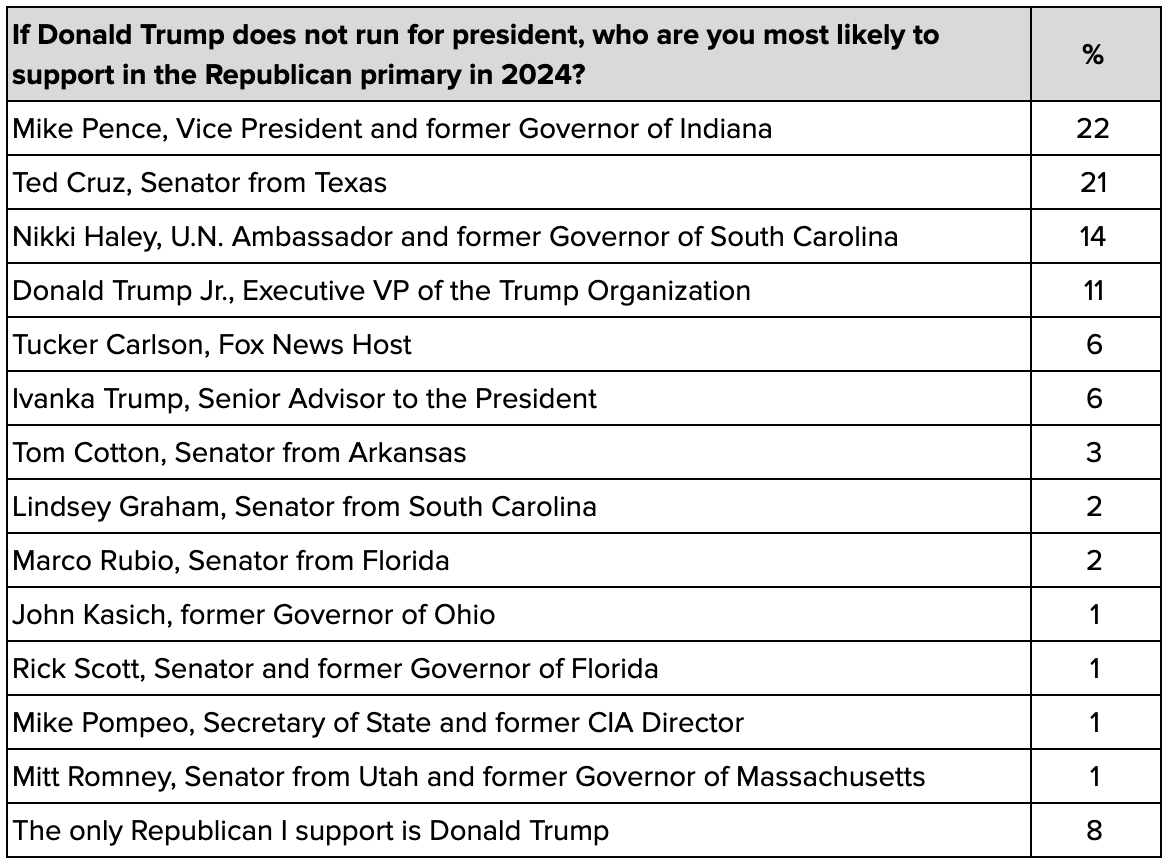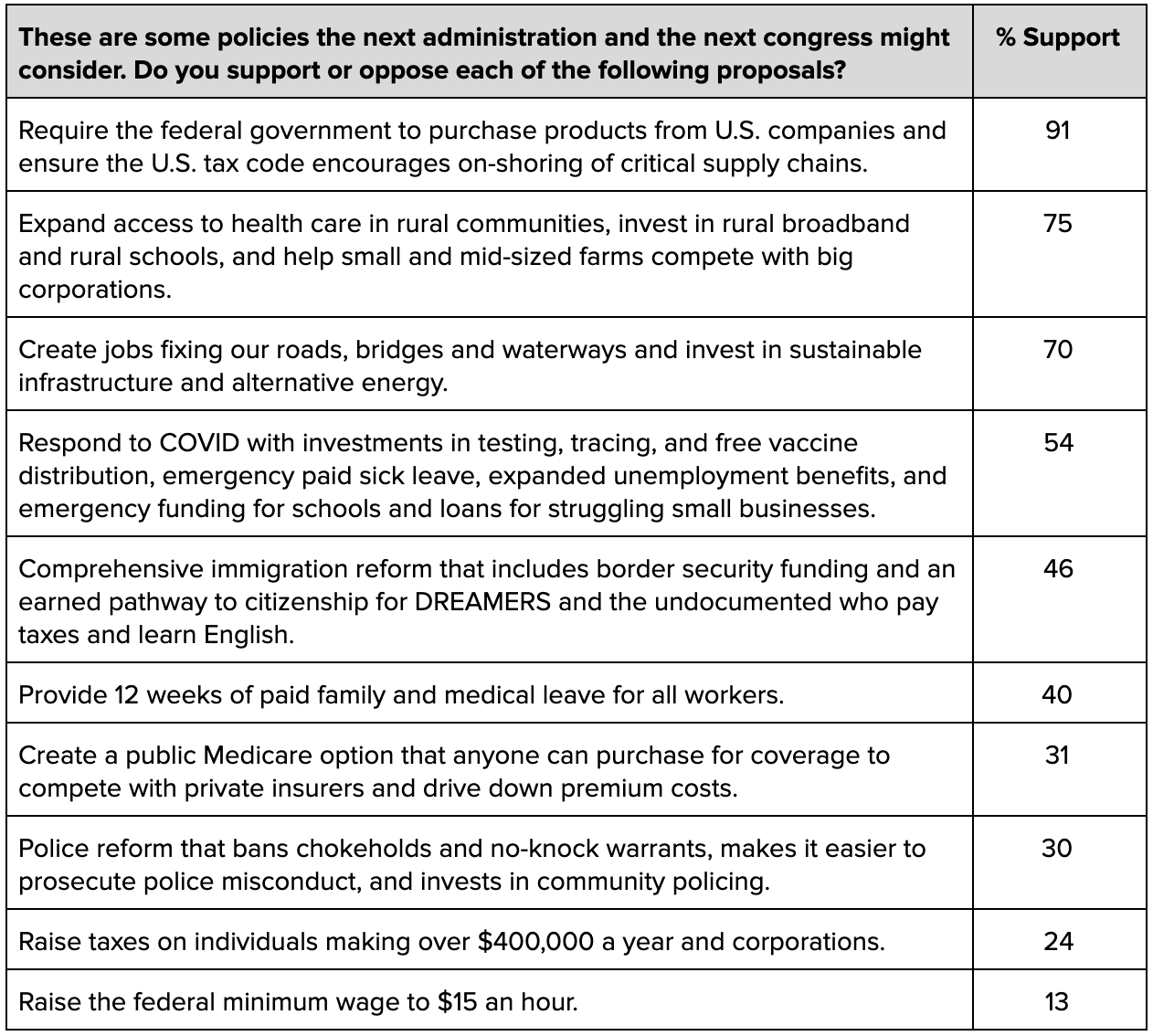Change Research/CNBC poll: November 18-21, 2020 of 2020 Trump voters nationally
Reaction to the election & transition
The lack of recognition of the legitimacy of the election among Trump voters is dramatic and devastating for our democracy. There is little desire for Trump to concede and few concerns about the implications of a delayed transition.
Only 3% of 2020 Trump voters accept the election of Joe Biden as legitimate, 73% believe Trump is the legitimate winner and 24% are unsure. We should not be surprised that so few say Biden is the real winner when given the opportunity to say they are unsure, as this is consistent with the GOP establishment’s view at this time. Educational attainment and age are important factors, with 18-34 year olds, seniors, and college graduates the least likely to believe Trump is the true winner. Trump voters who say Newsmax is one of their primary political news sources are particularly likely to call Trump the real winner.

We asked Trump voters to tell us in their own words for their reaction to Joe Biden being declared the 46th president. The dominant reactions were fear (scared, terrified, fearful, frightened) and disgust (disgusted, sick), and 18% of respondents did call Biden a cheater or alleged fraud.
 Roughly three-in-ten Trump voters believe Trump should “Fight in court until states certify results, and then concede to Joe Biden if Biden is certified the winner” (31%), more than twice as many believe Trump should “Fight in court until the Electoral College votes, and never concede to Joe Biden” (66%). Only 3% of Trump voters believe he should “Concede to Joe Biden and begin the process of a peaceful transition of power.”
Roughly three-in-ten Trump voters believe Trump should “Fight in court until states certify results, and then concede to Joe Biden if Biden is certified the winner” (31%), more than twice as many believe Trump should “Fight in court until the Electoral College votes, and never concede to Joe Biden” (66%). Only 3% of Trump voters believe he should “Concede to Joe Biden and begin the process of a peaceful transition of power.”
Fewer than 1-in-10 Trump voters are very or somewhat concerned about the impact of a delayed transition on national security readiness or pandemic response and vaccine distribution:
- National security officials warn that delaying the Biden transition will impact national security readiness. (9% very/somewhat concerned, 63% not at all).
- Public health officials warn that delaying the Biden transition will impact the pandemic response and could slow down vaccine distribution. (6% very/somewhat concerned, 75% not concerned at all).
Trump voters’ concerns about the Biden presidency
Prior to the election, 85% of voters who intended to vote for Trump said that the country was headed in the right direction. Today, only 38% of Trump voters believe we are on the right track.
We asked Trump voters what they were most worried about from a Biden presidency. The topics that came up most frequently were fears of socialism, fears of Kamala Harris becoming president, and fears of Biden selling our country out to China.

No Trump voters expressed favorable opinions of Kamala Harris in our favorability battery and 95% were very unfavorable towards her, but the large number of mentions in our open-ended responses and some of the language used to describe her was stunning. This is one of the responses that was suitable for public consumption: “They will enact the 25th Amendment, deeming him unsuitable for office. Once Biden is out Kamala Harris is acting President with Pelosi as VP, then we may as well bury ourselves in a 6ft hole and save ourselves the trouble because she will come after all who oppose.”
We also asked Trump voters which concerns about the Biden presidency they thought were most likely to happen. The most relevant concerns were open borders and amnesty for immigrants (51%), a COVID-19 economic shutdown (42%), and higher taxes on the middle class (42%). Immigration and open borders were mentioned in the open ends, but not as frequently as these results would lead you to expect.

The New Resistance
After the 2016 election, Republicans believed liberals were rooting for the failure of President Trump, refusing to acknowledge he was the legitimately elected president, not giving him a chance to govern, and promoting the “Russia Hoax”. Now, the shoe is on the other foot, but Trump voters are not inclined to follow their advice from 2016.
Nearly one-in-five Trump voters are “willing to give Joe Biden a chance as president” (19%) while 81% are not willing to give him a chance. Only 8% of voters who think Trump is the real winner will give him a chance compared to 47% of those who do not believe Trump is the legitimate winner. Voters under the age of 34 and college graduates are also more likely to say they will give him a chance.

To underscore how difficult it will be for Biden to appeal to Trump voters, 56% said they felt less positive towards Joe Biden when informed “Joe Biden said he wants to govern for all Americans, even those who didn’t vote for him.” Just 3% of Trump voters said that made them feel more positive towards Biden and 41% said it made no difference.
Three-in-four Trump voters support Republicans in Congress trying to impeach Joe Biden as soon as he is sworn in as president (76% support, 62% strongly support). Of course Joe Biden could not have committed a high crime or misdemeanor at that point, and the Republicans do not control the House of Representatives, but this says something about the base of the Republican Party and therefore, the incentives of GOP lawmakers. Support for impeachment was highest among voters who identify Newsmax as a primary source of political news (83% support).
Opportunities for consensus?
With that context in mind, we asked Trump voters how they felt about various policies that the next administration and the next congress might consider, and there are some policies that appeal to even Trump voters, at least in principle.
Majorities approve of Biden’s plan to encourage American manufacturing, his plans to help rural America, his plans for infrastructure investment including green energy investment, and his plan to respond to COVID-19. Even large minorities support a compromise on immigration like the bipartisan 2014 immigration bill and paid family and medical leave.
(To be clear, we are measuring support for policy goals without details, without specifying that these are proposals from a Democratic administration, and before the right-wing disinformation machine gets to work on them.)
Opposition to Biden is necessary to hold the part of the GOP motivated by loyalty to Trump that believes he won together with the part that is less enamored with him and more attached to reality, but our hope is that the strength of these proposals and the interests of some vulnerable GOP Senators will make progress on these priorities possible nonetheless.
The future for Trump and the GOP
Donald Trump is more popular than the Republican Party (96% favorable and 84% favorable, respectively) among Trump voters, and he will be more likely than any other ex-President to remain the leader of his party post-presidency.
In 2016, many voters did not think Trump was a typical Republican. This was a challenge for many Democrats who both struggled to tie down ballot Republicans to Trump convincingly, and also mistakenly believed that Trump was less popular than other Republicans. After four years, 93% of Trump voters agree with the statement “Donald Trump is representative of the core principles and policy positions of the Republican Party” and 54% strongly agree with that statement.
A stunning 72% of Trump voters say that they would be more likely to identify with the Trump Party if Donald Trump left the Republican Party and started his own political party. That includes 71% of those who identify as Republicans or lean-Republican and 81% of pure independents who voted for him.
Nearly as many Trump voters (69%) think Trump should run for president again in 2024, 22% say maybe/unsure, and only 9% believe that he should not run again. There is a clear divide between those who think Trump is the legitimate winner and those who do not believe that: 77% of those who think Trump won say he should run again while just 46% of those who do not believe say he should run again.
Donald Trump is the clear frontrunner, but if Donald Trump does not run, the top contenders for the GOP nomination are Vice President Pence and Senator Ted Cruz. Nikki Haley is the third most popular choice with 14% supporting her. Moderate voices like John Kasich and Mitt Romney enjoy almost no support whatsoever. The Trump children only claim 17% of the vote collectively (11% Trump Jr., 6% Ivanka Trump), but it would be a mistake to assume that one would capture the votes of the other if one were to run, as men are far less likely to support Ivanka Trump. Notably, 8% of Trump voters said that the only Republican that they support is Donald Trump, which is roughly the same number who denied Trump was representative of the core policy positions of the GOP.

If Donald Trump decides to go back into TV instead, seven-in-ten Trump voters are very likely to watch a Trump TV Network for their news and another 22% said they are somewhat likely. Just 15% of Trump voters believe Fox’s coverage of the election has been mostly fair and balanced, and Trump voters are increasingly seeking out alternative sources that confirm their world view.
For media inquiries, please email [email protected]
Change Research conducted a poll of 1,203 2020 Trump voters nationally on November 18-21, 2020. The full 2,559 voter sample was weighted to reflect the 2020 electorate, and the results were filtered to those who reported voting for Trump in 2020. All data shown in this document is among Trump voters only and the margin of error is +/- 2.83. Change Research reaches voters via targeted online ads that point people to an online survey instrument. Our Dynamic Online Sampling establishes and continuously rebalances advertising targets across region, age, gender, race, and partisanship to dynamically deliver large samples that accurately reflect the demographics of a population. Post stratification was done on state, gender, age, race, education, and 2020 presidential vote.

